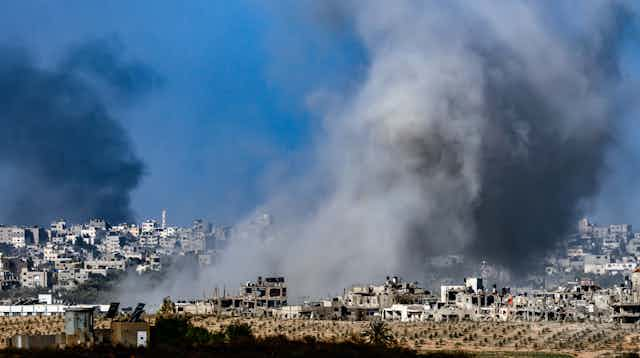For the past four decades, Israel’s experience of fighting paramilitary militias has been grim.
Its last major operation was in southern Lebanon, which started with Operation Peace for Galilee in 1982. While initially successful, the subsequent occupation of southern Lebanon led directly to the rise of the Hezbollah Shia militias, persistent losses for the Israel Defence Forces (IDF), a withdrawal to a nine-mile security zone within three years and from Lebanon as a whole in 2000.
In 2006 Israeli military units went back into Lebanon to counter Hezbollah rockets but ended with exhausted troops withdrawing in some disarray and the IDF resorting to a massive air war that did huge damage to the infrastructure of much of the country.
Then there is Gaza.
Before the current war, the IDF fought four other wars in Gaza since 2007, primarily to control Hamas’s use of rockets and its growing network of infiltration tunnels. The most significant one was Operation Protective Edge in 2014 which involved troops in a ground assault. In the event, they found the fighting extremely difficult, with the elite Golani Brigade experiencing serious casualties from the start.
Once again, there was intense use of air power and, as in the other wars, it was civilians that suffered most. Overall, the Israelis lost more than 300 killed in those four wars but for the Palestinians in Gaza, the death toll exceeded 5,300.
Bitter experience
Experiences in other wars are relevant to what happens now in Gaza. After the 9/11 attacks there was considerable international support for the US. War against the Taliban seemed inevitable though very few security analysts warned of the US-led coalition falling into a trap. The warnings were ignored and 20 years later the western troops finally retreated in disarray. Then came the Iraq war from 2003, with warnings once again ignored and, once again, with disastrous results.
As to Gaza, there are multiple concerns about what comes next, the current incursions being far short of a full-scale ground intervention. There are sharp differences of belief of what should come next within the military and within Benjamin Netanyahu’s government as well as within Israel as a whole, with much of it heightened by the concern over the loss of international support.
There is also concern about the experience of urban warfare elsewhere. Just six years ago, it took nine months for the US-led coalition to take back the Iraqi city of Mosul from Islamic State. The US led the huge air assault, aided by France, the UK and other partners. The ground forces then were Iraqi troops and militias and they lost 8,200 troops.

A further 10,000 civilians were killed, and the old city was wrecked. It was likened to Stalingrad in early 1943.
Just last year, a small force of Ukrainian soldiers held off a large Russian force for nearly three months in the siege of the Azovstal steel works in Mariupol using a network of 24 kilometres of Soviet-era tunnels. Hamas has constructed vastly more tunnels under Gaza and is no doubt ready for months of combat.
Dwindling international support
Three weeks ago, Israel suffered a grievous loss and rightly got huge initial support, but that is already fading. Worse still, there is a terrible inability of the current Israeli government to understand what it is dealing with in a ground invasion of Gaza. But the death toll tells us all we need to know. If we look at the five Gaza wars since 2007, including the current devastating war, the Israelis have lost 1,700 people, but the Palestinians have lost more than 13,000 – and the numbers are rising by hundreds every day.
For now, the public mood in Israel still supports the Netanyahu government, however unpopular it might have been just a month ago. But the small but persistent campaign by families of the hostages for them to be the priority is having an effect.
Above all, it is the change of mood internationally that is a deep concern in Israel and, indeed, in the Biden administration. This was shown by the weekend debate in the UN general assembly when only 12 states supported the US and Israel in voting against a “humanitarian pause”. Also, eight EU states were among the 120 supporting the motion and the 45 who abstained even included Britain.
In some previous Israeli military actions, the end has effectively come about when international support for Israel has collapsed or got close to that. If the ground war against Hamas had started within a few days of the shock of October 7, and if that operation had been successful and Hamas had collapsed, then Netanyahu could have claimed success.
That has not happened and will not happen now. Instead, there is every prospect of a bitter war with many thousands more Palestinians killed, tens of thousands of young Palestinians all too ready to fight in the future, and a peaceful resolution of the Israel/Palestine conflict delayed by at least another generation.


